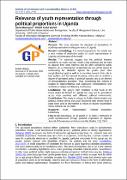Relevance of youth representation through political proportions in Uganda
Abstract
Purpose: This study discusses the relevance of proportions of youth representatives in the governance of Uganda
Research methodology: The central approach for this article was a desk review of obtainable works on youth representation in Uganda and other parts of the world
Results: The outcomes suggest that the political interests considered as youth interests remain a big challenge and are hard to separate from other interests and are often considered public interests. As a consequence, proportions are one of the means to reimbursing for obstacles against the youths (and other marginalised groups) as well as an incentive towards their role in both politics and the national economy, which aim to achieve a degree of age-based parity in political statistics and as an element of democratisation processes. Thus, considering this method in relation to representational and expressive representatives who symbolise a unique constituency is necessary.
Limitations: This study's main limitation is that much of the issues raised are limited to Uganda and may not be generalized across other countries with different political environments. Contribution: This study is relevant to Public Administration and political science seeing that youth functional roles remain loose in poise since what is represented is reliant on diverse stakeholders whose interests are not static.
Collections
- Research Articles [139]

